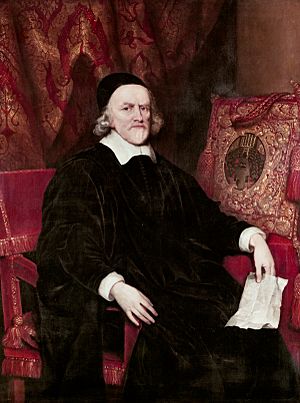Richard Keble facts for kids
Richard Keble (who died in 1683 or 1684) was an English lawyer and judge. He supported the Parliament during the English Civil War. This was a big conflict in England. During the time when England had no king (called the Interregnum), he helped look after the Great Seal. This was a very important tool used to make official documents legal. He also worked as a judge and led some important court cases. When the king returned to power (this was called the Restoration), a law was passed called the Indemnity and Oblivion Act. Because of this law, Richard Keble was not allowed to hold any more public jobs.
Contents
Early Life and Career
Richard Keble came from Suffolk, a county in England. His family was old and lived in a place called Old Newton. He started studying law at Gray's Inn on August 7, 1609. He became a lawyer on July 14, 1614. Later, in 1639, he became a "Lent Reader," which was a special teaching role at Gray's Inn.
In March 1647, the Parliament chose him to be a judge in Wales. By 1648, he became a "serjeant-at-law." This was a very senior type of lawyer.
Working for the Government
In 1648, Keble was sent to Norwich to help deal with a group of soldiers who were causing trouble. After King Charles I was executed in 1649, Richard Keble was given a very important job. He became one of three "Lord Commissioners" who were in charge of the Great Seal. This seal was used to make official government papers valid. He worked with Bulstrode Whitelocke and John Lisle. Each of them earned a good salary of £1000 a year.
Richard Keble, along with William Lenthall, helped create new rules for the Court of Chancery. This was a special court that dealt with fairness and justice.
Important Trials
Richard Keble was the judge in two very important trials. One was in October 1649, for John Lilburne. Lilburne was a leader of a group called the Levellers, who wanted more rights for common people. The other trial was in 1651, for Christopher Love. Love was a Presbyterian, a type of Protestant, who was accused of plotting against the government.
During Love's trial, Keble famously said that "whatsoever is not consonant to Scripture in the Law of England, is not the Law of England." This meant that if something in English law didn't agree with the Bible, it wasn't truly law.
In April 1654, Thomas Widdrington took over Keble's job as Lord Commissioner. This change happened mostly for political reasons. Keble had made some powerful people unhappy while working as a judge.
Later Life and Reputation
Richard Keble did not always get his salary paid on time. He asked for the money he was owed in 1655, but he still hadn't received it by 1658.
When the king returned to power in 1660, a law called the Indemnity and Oblivion Act was passed. This law offered a general pardon to many people who had supported Parliament during the Civil War. However, Richard Keble was specifically excluded from this pardon. This meant he was not allowed to hold any public office ever again.
Some people, like Hilkiah Bedford, who was a political opponent, spoke badly of Keble. They said he was unfair and sent people to jail or even to their deaths without proper trials, especially if he thought they supported the king.
However, other historians have different views. Edward Foss, another writer, thought that Keble acted "with less unfairness and severity" than some of his fellow judges. The trials he led, like those of Lilburne and Love, followed the usual legal steps of the time. Richard Keble's will, which is like a last testament, was written in April 1673 and officially approved in August 1684.
Family Life
Richard Keble was married to a woman named Mary Sickelmor. They had a son named Joseph Keble, who was their fourth child.
Images for kids
 | Bessie Coleman |
 | Spann Watson |
 | Jill E. Brown |
 | Sherman W. White |



